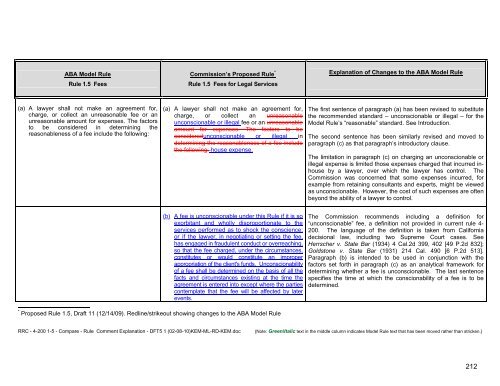Sorted by Commenter - Ethics - State of California
Sorted by Commenter - Ethics - State of California
Sorted by Commenter - Ethics - State of California
Create successful ePaper yourself
Turn your PDF publications into a flip-book with our unique Google optimized e-Paper software.
ABA Model Rule<br />
Rule 1.5 Fees<br />
(a) A lawyer shall not make an agreement for,<br />
charge, or collect an unreasonable fee or an<br />
unreasonable amount for expenses. The factors<br />
to be considered in determining the<br />
reasonableness <strong>of</strong> a fee include the following:<br />
Commission’s Proposed Rule *<br />
Rule 1.5 Fees for Legal Services<br />
(a) A lawyer shall not make an agreement for,<br />
charge, or collect an unreasonable<br />
unconscionable or illegal fee or an unreasonable<br />
amount for expenses. The factors to be<br />
consideredunconscionable or illegal in<br />
determining the reasonableness <strong>of</strong> a fee include<br />
the following:-house expense.<br />
(b) A fee is unconscionable under this Rule if it is so<br />
exorbitant and wholly disproportionate to the<br />
services performed as to shock the conscience;<br />
or if the lawyer, in negotiating or setting the fee,<br />
has engaged in fraudulent conduct or overreaching,<br />
so that the fee charged, under the circumstances,<br />
constitutes or would constitute an improper<br />
appropriation <strong>of</strong> the client's funds. Unconscionability<br />
<strong>of</strong> a fee shall be determined on the basis <strong>of</strong> all the<br />
facts and circumstances existing at the time the<br />
agreement is entered into except where the parties<br />
contemplate that the fee will be affected <strong>by</strong> later<br />
events.<br />
* Proposed Rule 1.5, Draft 11 (12/14/09). Redline/strikeout showing changes to the ABA Model Rule<br />
Explanation <strong>of</strong> Changes to the ABA Model Rule<br />
The first sentence <strong>of</strong> paragraph (a) has been revised to substitute<br />
the recommended standard – unconscionable or illegal – for the<br />
Model Rule’s “reasonable” standard. See Introduction.<br />
The second sentence has been similarly revised and moved to<br />
paragraph (c) as that paragraph’s introductory clause.<br />
The limitation in paragraph (c) on charging an unconscionable or<br />
illegal expense is limited those expenses charged that incurred inhouse<br />
<strong>by</strong> a lawyer, over which the lawyer has control. The<br />
Commission was concerned that some expenses incurred, for<br />
example from retaining consultants and experts, might be viewed<br />
as unconscionable. However, the cost <strong>of</strong> such expenses are <strong>of</strong>ten<br />
beyond the ability <strong>of</strong> a lawyer to control.<br />
The Commission recommends including a definition for<br />
“unconscionable” fee, a definition not provided in current rule 4-<br />
200. The language <strong>of</strong> the definition is taken from <strong>California</strong><br />
decisional law, including two Supreme Court cases. See<br />
Herrscher v. <strong>State</strong> Bar (1934) 4 Cal.2d 399, 402 [49 P.2d 832];<br />
Goldstone v. <strong>State</strong> Bar (1931) 214 Cal. 490 [6 P.2d 513].<br />
Paragraph (b) is intended to be used in conjunction with the<br />
factors set forth in paragraph (c) as an analytical framework for<br />
determining whether a fee is unconscionable. The last sentence<br />
specifies the time at which the conscionability <strong>of</strong> a fee is to be<br />
determined.<br />
RRC - 4-200 1-5 - Compare - Rule Comment Explanation - DFT5 1 (02-08-10)KEM-ML-RD-KEM.doc {Note: Green/Italic text in the middle column indicates Model Rule text that has been moved rather than stricken.}<br />
212












![Proposed Rule 4.1 [N/A] “Truthfulness in Statements to Others” - Ethics](https://img.yumpu.com/19037854/1/190x245/proposed-rule-41-n-a-truthfulness-in-statements-to-others-ethics.jpg?quality=85)



